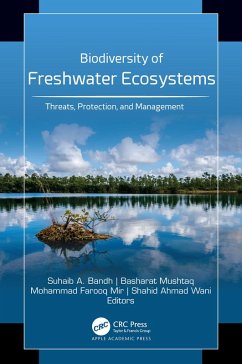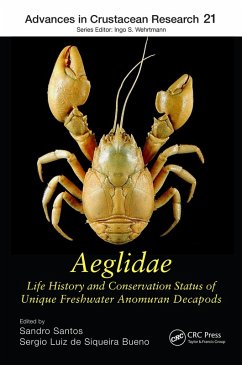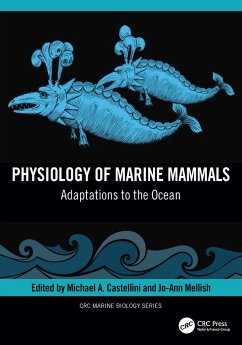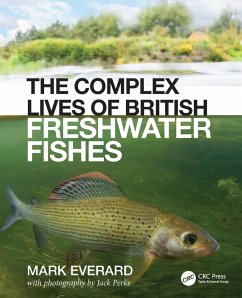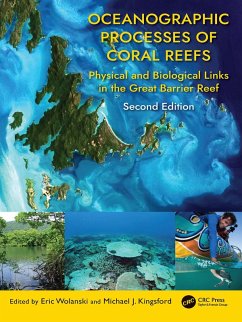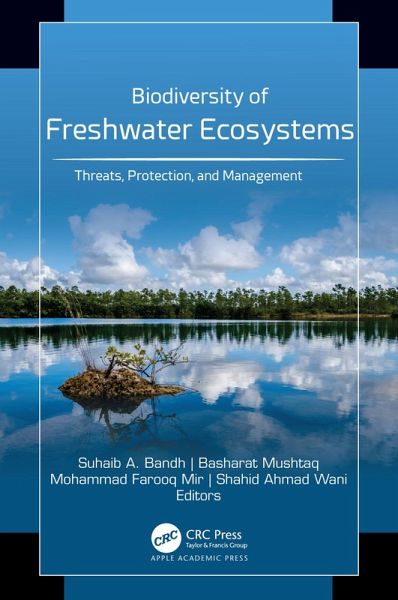
Biodiversity of Freshwater Ecosystems (eBook, PDF)
Threats, Protection, and Management
Redaktion: Bandh, Suhaib A.; Wani, Shahid A.; Mir, Mohammad Farooq; Mushtaq, Basharat
Versandkostenfrei!
Sofort per Download lieferbar
129,95 €
inkl. MwSt.
Weitere Ausgaben:

PAYBACK Punkte
65 °P sammeln!
This new volume examines the ecological importance, threats, protection, and management of the biodiversity of freshwater ecosystems, such as lakes, ponds, rivers, streams, reservoirs, pools, and wetlands. As populations have been increasing exponentially, humans are using freshwater ecosystems severely, resulting in habitat destruction and breakdown. Environmental contamination, climate change, the introduction of harmful and invasive organisms, unplanned dredging and de-weeding processes, disposal of sewer systems in freshwater bodies, and badly planned water diversions are the leading cause...
This new volume examines the ecological importance, threats, protection, and management of the biodiversity of freshwater ecosystems, such as lakes, ponds, rivers, streams, reservoirs, pools, and wetlands. As populations have been increasing exponentially, humans are using freshwater ecosystems severely, resulting in habitat destruction and breakdown. Environmental contamination, climate change, the introduction of harmful and invasive organisms, unplanned dredging and de-weeding processes, disposal of sewer systems in freshwater bodies, and badly planned water diversions are the leading causes of habitat loss in freshwaters. These impacts have led to significant decreases in the numbers and productivity of many freshwater species and decreased biodiversity in freshwater.
This book presents a selection of primary research and review papers on several freshwater aquatic biodiversity studies, which involve evaluating plants, macroinvertebrates, macrophytes, benthic zones, and fish diversity in freshwater ecosystems. It provides an abundance of new information on freshwater biodiversity distribution, status, and patterns.
Key features:
Biodiversity of Freshwater Ecosystems: Threats, Protection, and Management promotes the enhancement and strengthening of freshwater protection and its unique biodiversity for scientists, policymakers, scholars, researchers, NGOs, and the public, providing necessary background knowledge and practical tools to help manage aquatic ecosystems and their biodiversity in a holistic manner.
This book presents a selection of primary research and review papers on several freshwater aquatic biodiversity studies, which involve evaluating plants, macroinvertebrates, macrophytes, benthic zones, and fish diversity in freshwater ecosystems. It provides an abundance of new information on freshwater biodiversity distribution, status, and patterns.
Key features:
- Discusses the importance, threats, and management of biodiversity of freshwater ecosystems
- Provides detailed coverage of modern and updated techniques used in the evaluation and conservation of freshwater biodiversity
- Looks at the impact of pesticides pollution on freshwater environs, and on aquatic and terrestrial life
- Reviews how global climate change affects freshwater biodiversity
Biodiversity of Freshwater Ecosystems: Threats, Protection, and Management promotes the enhancement and strengthening of freshwater protection and its unique biodiversity for scientists, policymakers, scholars, researchers, NGOs, and the public, providing necessary background knowledge and practical tools to help manage aquatic ecosystems and their biodiversity in a holistic manner.
Dieser Download kann aus rechtlichen Gründen nur mit Rechnungsadresse in A, B, BG, CY, CZ, D, DK, EW, E, FIN, F, GR, HR, H, IRL, I, LT, L, LR, M, NL, PL, P, R, S, SLO, SK ausgeliefert werden.




